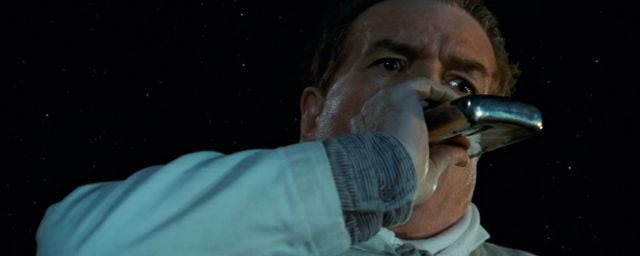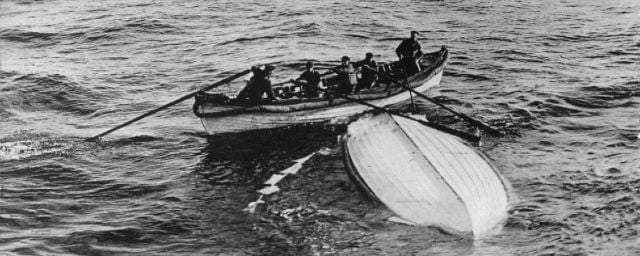Alcohol abuse is dangerous to your health…but could it, in some extreme cases, save your life? Rather, it will give you the courage to survive, it seems, if we believe the incredible story of Charles Jogin, the head baker of the Titanic, who survived the most famous shipwreck in history unscathed.
In his legendary film, James Cameron tried to include as much real history as possible, even the main one, Rose and Jack, is pure fiction. However, years later we learned that we had found someone named J. Grave of Dawson who died in the shipwreck: his name was Joseph and he was just a laborer with many others. However, every year hundreds of people come to arrange flowers, mixing fantasy and reality.
But there was Charles Jogin. If you watch the movie carefully, you may have noticed this mustachioed baker appearing near Jack and Rose while the ship is on its last descent and the remaining survivors are trying to hold on to the railing of the bridge. We see him take his last sip of alcohol before inevitably also ending up in the icy waters of the North Atlantic.
He is played by Liam Tuohy, but this supporting character is actually based on a real person, Charles Joughin, the ship’s chief baker, whose story of survival is one of the most remarkable on that fateful night.
Indeed, as 1,500 screaming, panicked souls choked and froze around him, the baker nonchalantly stepped off the back of the sunken liner before calmly riding off into the dawn. After being rescued by lifeboat, he returned to work a few days later.
Impossible to achieve?
This is almost a physiologically impossible feat. But according to the British Titanic inquiry held at the time, it was because the 33-year-old Englishman had the presence of mind to drunkenly welcome the biggest maritime disaster in history.
The feeling of heat from a glass of alcohol is caused by vasodilatation, the phenomenon of warm blood circulation on the surface of the skin. However, in a survival situation, keeping all that warm blood away from vital organs usually means the drinker is at greater risk of hypothermia.
However, Canadian hypothermia expert Gordon Giesbrecht estimates that the -2°C water in the North Atlantic was cold enough to quickly constrict Jogin’s blood vessels and negate any effects of alcohol. And in the end, the effect of alcohol on him was to give him more courage in liquid form.

Thus, Jogin’s actions that night reflect a man unfazed by impending disaster. Sensing a collision with an iceberg, the head baker jumped from his perch and sent his team to the lifeboats with bread and biscuits. He then returned to his cabin for a drink before returning to help load the boats. Not only did Joughin refuse to board the boat in his own seat, but he and several other men began forcing reluctant women into empty seats, presumably to save their lives.
At 1:30 a.m., when the Titanic’s upper deck was mostly empty of lifeboats, Joughin returned to his cabin for another drink.
“He sat down on his bunk and continued to drink, aware but unconcerned about the water that was now swirling around the cabin door.“- writes historian Walter Lord in his book A night to remember. Lorde remained in contact with Jogin until the baker’s death in 1956.
He then began throwing deckchairs around the ship, trying to supply the castaways with impromptu flotation devices, before returning to his hold for a glass of water. Finally, the baker was in the stern when the ship split in two. And yet, he does not remember the violent and catastrophic breakup: “It wasn’t a big shock or anything– he said during the investigation.
No “cold shock” for baking?
At precisely 2:20 a.m., he ascended like an elevator to the top of the sunken liner before waiting until the last minute to enter the water. The first stage of submersion in cold water is known as “cold shock,” a terrifying sensation described by Titanic’s second officer, Charles Lightoller, as “If a thousand knives were stuck in his body“. Common side effects include wheezing and hyperventilation.
Even today there is a myth that the human body cannot survive more than a few minutes in the ocean. In fact, the “cold shock” ends after 90 seconds. Even in the winter waters of the North Atlantic, the average adult still has 10 minutes before he goes numb and at least an hour before his heart stops.
Nevertheless, cold shock was a stage that many Titanic victims did not survive. In the panic of the first minutes, many drowned or significantly accelerated the loss of body temperature.

Titanic deleted scene image (1997)
But Jogin, taking care to secure his life preserver, entered the ocean without panic: “I was swimming and swimming“, he said. According to Stephen Chung of Brock University, a Canadian expert on hypothermic reactions, Baker’s alcohol consumption may have played a role.to increase or strengthen courage“.
“It would also reduce his sense of cold so he could be more fearless and not feel cold and therefore not panic“, he wrote in a letter to the National Post.
An unintentional example of survival
Thus, the baker became, unwittingly, an example of how to survive a shipwreck. First, he delayed the dive, being the last to enter the water that night. Second – and most importantly – he managed to stay calm and strategize his way out of it.
It’s a tragedy that first responders see all too often: victims who panic and die with their salvation right in front of them—like victims of a fire that predisposes rather than leads to a fire accident.
Jogin spent almost two hours in the dark before taking advantage of the first rays of the dawn sun to see the overturned lifeboat. He pulled himself out of the water and was eventually rescued by a passing lifeboat.

The crew members of the Canadian ship Mackay-Bennett recovered the overturned lifeboat in which Charles Joughen had taken refuge.
When he was brought aboard the rescue ship RMS Carpathia, Jogin was in pretty good shape: “I was fine except for my legs, which were swollen“, she said.
Given the circumstances, Gordon Giesbrecht said the only step Charles Jowin would have missed was to put on more clothes. Indeed, extra layers, even when damp, slow down the loss of body heat.
After the disaster, Joughin returned to the naval bakery and worked long enough to make bread for World War II warships. Although he gave few interviews, the comic relief of the “Drunken Baker” is featured in many fictional accounts of disasters such as the Titanic.
But while researchers are still obsessing over the “Charles Johin case,” there may just be a man behind it all who doesn’t want to die:It is impossible for scientists to predict who will act well and who will react well in extreme situationsStephen Chung noted. “Some people give up very quickly, some just can’t kill.“That was, apparently, the work of this dear baker.
Titanic is available to watch again on Disney+.
A similar article has already been published on our Spanish site Sensacine.com.
Source: Allocine
Rose James is a Gossipify movie and series reviewer known for her in-depth analysis and unique perspective on the latest releases. With a background in film studies, she provides engaging and informative reviews, and keeps readers up to date with industry trends and emerging talents.



![Un Si Grand Soleil Preview: Episode Summary for Tuesday, October 28, 2025 [SPOILERS] Un Si Grand Soleil Preview: Episode Summary for Tuesday, October 28, 2025 [SPOILERS]](https://fr.web.img2.acsta.net/img/cb/ba/cbba991ec6092b42c6fe91c18f33c426.jpg)

